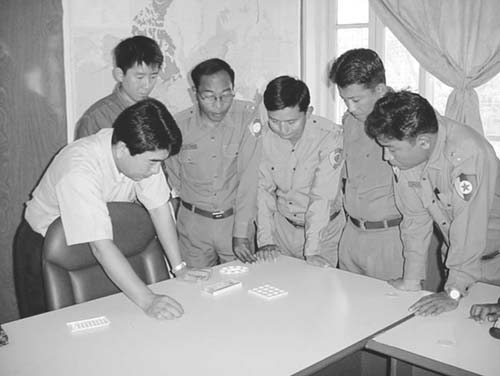Japan's Official Development Assistance White Paper 2006
Main Text > Part II ODA DISBURSEMENTS IN FISCAL YEAR 2005 > Chapter 2 Details about Japan's ODA > Section 2. Measures for Each of the Priority Issues > 3. Addressing Global Issues > (8) Drugs
(8) Drugs
The drug problem is a serious global issue that poses a direct threat to people's living and livelihoods, and also poses the danger of undermining the future of the international community. It is an issue that must be addressed through enhanced, coordinated efforts of the international community. In recent years in the Asian region, in the "Golden Triangle"40 to begin with, the problem of synthetic drugs has worsened and smuggling by international drug syndicates has become even more sophisticated. Huge illegal profits appear to be made by these syndicates. Most of the narcotics flooding into Japan are smuggled in from foreign countries with the involvement of drug syndicates, and their impact on Japan is incalculable. Moreover, from the perspective of "human security," Japan places importance on tackling the drug problems in the international community, and supports anti-drug measures implemented under international cooperation involving relevant international organizations.
As for bilateral assistance, Japan is providing support to prevent drug-related crimes and enhance regulatory capabilities in regions where drugs that are supplied to Japan are being illegally manufactured. In particular, taking into account that the poverty issue is at the background of drug problems, Japan is providing assistance for alternative crops development projects such as through NGOs to help the residents of these countries overcome poverty without relying on the cultivation of the poppy and other plants used to manufacture drugs.
Specifically, the Government of Japan commenced the three-year-long Drug Control Regional Cooperation Project (2002-2005) based in Thailand, to assist Thailand and its surrounding countries (Cambodia, Laos, Myanmar, and Viet Nam) to improve their drug analysis skills and regulatory capabilities that would utilize analysis results. Through the project, seminars on drug control and drug analysis were held in each country. Moreover, trainees from each country were accepted to receive training in Japan. Over three years this project made a huge contribution to the improvement of the narcotics law enforcement capacity of these countries, including the dispatch of five experts, the acceptance of 14 trainees for training in Japan, and the provision of equipment and materials.

A scene of the seminar for drug controlling officials
Moreover, Japan is an active participant in international conferences such as the United Nations Commission on Narcotic Drugs (CND). In addition, Japan annually contributes to the Fund of the United Nations International Drug Control Programme (UNDCP), which is managed and operated by the United Nations Office on Drugs and Crime (UNODC). In FY2005 Japan contributed US$2.5 million. Utilizing these funds, assistance was provided for projects such as enhancing crackdowns on illegal drug trafficking at national borders of Southeast Asian countries; providing training on methods for analyzing confiscated drugs, particularly amphetamine-type stimulants; developing the rural areas in Myanmar to curtail dependence on poppy cultivation; and preventing the abuse of synthetic drugs by young people in Thailand and the Philippines. Furthermore, through the Trust Fund for Human Security Japan provided assistance to Drug Abuse Counseling, Treatment and Rehabilitation Services in Cambodia, a project implemented by UNODC, to respond to the threat that the rapid increases in illegal drug abuse and the sharing of drug needles pose to the community.


 Next Page
Next Page